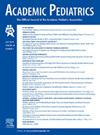感染 SARS-CoV-2 与感染后 6 个月和 12 个月的生活质量没有关系
IF 3
3区 医学
Q1 PEDIATRICS
引用次数: 0
摘要
目的:评估 SARS-CoV-2 感染与长期生活质量(QoL)之间的关系:评估 SARS-CoV-2 感染与长期生活质量(QoL)之间的关系:方法:在加拿大的 14 家机构开展为期 6 个月和 12 个月的前瞻性队列研究。2020年8月至2022年2月期间接受SARS-CoV-2检测的儿童均符合条件。使用 PedsQLTM-4.0 测量 QoL,检测后 6 个月和 12 个月的总体健康状况评分:在符合长期随访条件的 SARS-CoV-2 阳性和阴性参与者中,分别有 74.8%(505/675)和 71.8%(1106/1541)完成了 6 个月的随访,59.0%(727/1233)和 68.1%(2520/3699)完成了 12 个月的随访。阳性组和阴性组的 PedsQL™ 评分平均值(± SD)没有差异;差异为-0.86(95%C):-6个月和12个月时的差异分别为-0.86(95%CI:-2.33,0.61)和-0.48(95%CI:-1.6,0.64)。SARS-CoV-2 检测阳性与较高的社会分量表得分有关。虽然在双变量分析中,SARS-CoV-2 病例在 6 个月时的总体健康状况较高[差异:2.16(95%CI:0.80,3.53)],但在调整共同变量后,SARS-CoV-2 感染与两个时间点的 PedsQL™ 总分或总体健康状况均无独立关联。在任一时间点,父母对孩子康复的看法并不因SARS-CoV-2检测结果而不同:结论:SARS-CoV-2 感染与感染后 6 个月和 12 个月的 QoL、总体健康状况或父母对康复的看法无关:不详。本文章由计算机程序翻译,如有差异,请以英文原文为准。
No Association between SARS-CoV-2 Infection and Quality of Life 6- and 12-Months After Infection
Objective
To assess the association between Severe Acute Respiratory Syndrome Coronavirus 2 (SARS-CoV-2) infection and long-term quality of life (QoL).
Methods
Prospective cohort study with 6- and 12-months follow-up conducted in 14 Canadian institutions. Children tested for SARS-CoV-2 between August 2020 and February 2022 were eligible. QoL was measured using PedsQL-4.0, overall health status scores 6- and 12-months after testing.
Results
Among SARS-CoV-2 positive and negative participants eligible for long-term follow-up, 74.8% (505/675) and 71.8% (1106/1541) at 6- and 59.0% (727/1233) and 68.1% (2520/3699) at 12-months, completed follow-up, respectively. Mean ± SD PedsQL scores did not differ between positive and negative groups; difference: −0.86 (95% CI: −2.33, 0.61) at 6- and −0.48 (95% CI: −1.6, 0.64) at 12-months, respectively. SARS-CoV-2 test-positivity was associated with higher social subscale scores. Although in bivariate analysis, overall health status at 6-months was higher among SARS-CoV-2 cases [difference: 2.16 (95% CI: 0.80, 3.53)], after adjustment for co-variates, SARS-CoV-2 infection was not independently associated with total PedsQL or overall health status at either time point. Parental perception of recovery did not differ based on SARS-CoV-2 test-status at either time point.
Conclusions
SARS-CoV-2 infection was not associated with QoL, overall health status, or parental perception of recovery 6- and 12-months following infection.
求助全文
通过发布文献求助,成功后即可免费获取论文全文。
去求助
来源期刊

Academic Pediatrics
PEDIATRICS-
CiteScore
4.60
自引率
12.90%
发文量
300
审稿时长
60 days
期刊介绍:
Academic Pediatrics, the official journal of the Academic Pediatric Association, is a peer-reviewed publication whose purpose is to strengthen the research and educational base of academic general pediatrics. The journal provides leadership in pediatric education, research, patient care and advocacy. Content areas include pediatric education, emergency medicine, injury, abuse, behavioral pediatrics, holistic medicine, child health services and health policy,and the environment. The journal provides an active forum for the presentation of pediatric educational research in diverse settings, involving medical students, residents, fellows, and practicing professionals. The journal also emphasizes important research relating to the quality of child health care, health care policy, and the organization of child health services. It also includes systematic reviews of primary care interventions and important methodologic papers to aid research in child health and education.
 求助内容:
求助内容: 应助结果提醒方式:
应助结果提醒方式:


